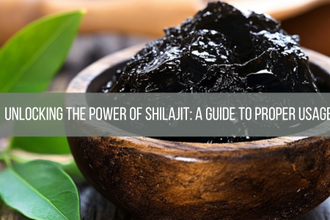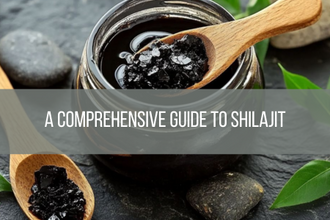
Shilajit, a fascinating substance revered in traditional medicine, is gaining attention for its potential health benefits.
Formed over centuries from decomposed plant matter in the Himalayas, this mineral-rich resin is packed with vital nutrients.
This article explores its chemical components, traditional uses across various cultures, and the promising health benefits it may offer.
We discuss possible side effects and tips for safe consumption. Join us as we uncover the science behind this ancient remedy.
Key Takeaways:
What Is Shilajit?
.jpg_00.jpeg)
Shilajit is a potent natural substance that has been revered in traditional medicine, particularly within Ayurveda, for centuries. This unique resin is derived from the decomposition of plant matter over thousands of years and is typically found in the high-altitude mountainous rocks of the Himalayas. Shilajit is rich in fulvic acid and various minerals, making it a popular choice for dietary supplements aimed at enhancing overall health and well-being. The health benefits of Shilajit are numerous, including potential positive effects on cholesterol levels, immune response, and even sperm count.
How Is Shilajit Formed?
Shilajit is formed through a complex geological and biological process that takes place over centuries in the mountainous regions of the Himalayas, particularly at high altitudes. This natural resin emerges from the decomposition of organic plant materials, and as it undergoes mineralization, it becomes rich in fulvic acid and other trace minerals.The process begins with the accumulation of plant matter in the soil over thousands of years. As this organic material breaks down, it is subjected to various geological forces, including immense pressure and temperature changes characteristic of high-altitude environments.
- This unique setting does not only promote mineralization but also enhances the concentration of beneficial compounds found in Shilajit.
- Fulvic acid plays a pivotal role in this process, facilitating the absorption of important nutrients and aiding in their transportation within the body.
- The trace minerals that develop alongside fulvic acid are essential for numerous biochemical processes, contributing to overall health and vitality.
Understanding these natural processes highlights the significance of Shilajit, not just as a substance, but as a remarkable result of the Earth's geological and biological interactions.
What Are The Chemical Components Of Shilajit?
Shilajit is composed of a variety of chemical components that contribute to its health benefits and effectiveness as a supplement. The most significant compound is fulvic acid, which plays a crucial role in nutrient absorption and has antioxidant properties. Additionally, Shilajit contains humic acid, dibenzo-alpha-pyrones, and a range of essential trace minerals that work synergistically to support health and well-being.
Fulvic Acid
Fulvic acid is one of the primary components of Shilajit and is widely recognized for its potent health benefits, particularly in combating oxidative stress and enhancing nutrient absorption in the body. This natural compound also supports cellular function, promotes detoxification, and helps in maintaining optimal health.Beyond these advantages, fulvic acid possesses remarkable biochemical properties that facilitate the transport of essential minerals and nutrients to cells. By chelating minerals, it maximizes their bioavailability, ensuring they are effectively utilized in metabolic processes.
- As a potent antioxidant, fulvic acid helps neutralize free radicals, thereby reducing cellular damage.
- Research also indicates that it may improve gut health by fostering a balanced microbiome.
Clinical studies have shown that individuals supplementing with fulvic acid experienced enhanced recovery from exercise and improved overall vitality. With ongoing investigations, the myriad interactions it has with other vital nutrients suggest that fulvic acid holds great promise for supporting systemic health and longevity.
Humic Acid
Humic acid, another essential component of Shilajit, offers numerous health benefits, particularly in enhancing the absorption of minerals and nutrients in the body. It also contributes to improved gut health and can aid in the detoxification process.Along with its vital role in nutrient absorption, humic acid has been shown to support immune function, thereby fortifying the body against various ailments. By promoting a balanced gut microbiome, this natural compound can help alleviate digestive issues, paving the way for better overall health. Its antioxidant properties help combat oxidative stress, which is a key factor in many chronic diseases.
- Enhanced mineral absorption: By facilitating the uptake of minerals such as calcium and magnesium, humic acid ensures that the body receives essential nutrients for optimal function.
- Detoxification support: It binds to heavy metals and toxins, assisting the liver in filtering out harmful substances.
- Gut health improvement: Adequate humic acid levels may alleviate symptoms of gastrointestinal discomfort and support a healthy digestive tract.
Integrating humic acid into one’s wellness regimen can lead to a more robust health profile and a greater sense of vitality.
Dibenzo-Alpha-Pyrones
.jpg_01.jpeg)
Dibenzo-alpha-pyrones are unique compounds found in Shilajit that are known for their strong antioxidant properties, which help in reducing oxidative stress and promoting overall cellular health.
These intriguing compounds play a crucial role in maintaining the body’s biological balance by neutralizing free radicals and improving the efficacy of various enzymes involved in detoxification. Studies have shown that their antioxidant capabilities can significantly enhance the immune system, making the body more resilient against diseases.
- For instance, a clinical study published in the Journal of Ethnopharmacology indicated that the consumption of Shilajit extracts led to a notable decrease in markers of oxidative stress.
- Another research highlighted that these compounds may support cardiovascular health by improving endothelial function and reducing inflammation.
The presence of dibenzo-alpha-pyrones in Shilajit serves not only as a natural defense mechanism but also as a vital contributor to the body’s long-term health and vitality.
Trace Minerals
Trace minerals present in Shilajit play a crucial role in maintaining various bodily functions, including supporting the immune response, promoting collagen synthesis, and regulating cholesterol levels.
These essential minerals act as cofactors for numerous enzymatic reactions, aiding in the production of energy and the regulation of metabolism. Among the notable trace minerals found in Shilajit are zinc, copper, and selenium, each contributing uniquely to the body’s needs.
For instance, zinc is integral for immune function, helping to ward off infections, while copper supports cardiovascular health by facilitating proper iron absorption and utilization. Selenium, on the other hand, is renowned for its antioxidant properties, which can mitigate oxidative stress and inflammation.
- Benefits: Each mineral works in tandem, enhancing the effects of others, thereby creating a synergistic impact that contributes to overall well-being.
- Health Issues: This collaboration is particularly beneficial for those dealing with thyroid disorders, fatigue, and skin health concerns, making Shilajit a valuable addition to a balanced diet.
What Are The Traditional Uses Of Shilajit?
Shilajit has a rich history of traditional use in various medicinal systems, particularly in Ayurvedic medicine, where it is valued for its extensive health benefits. Traditionally, Shilajit has been used to address a myriad of health issues, including increasing vitality, improving fertility, and enhancing cognitive function.
Ayurvedic Medicine
In Ayurvedic medicine, Shilajit is frequently referred to as a 'Rasayana' or rejuvenator, and it is utilized to enhance vitality, support mental clarity, and contribute to overall well-being.This ancient substance, formed from the decomposition of plant materials over centuries, is revered for its potent healing properties. The philosophy behind its use aligns with Ayurveda's focus on balance and harmony within the body. Shilajit is thought to help replenish energy levels and combat fatigue, which is essential for maintaining a healthy lifestyle.
- Health Benefits: Many practitioners recommend Shilajit as a supplement to support immune function, improve digestion, and enhance physical performance.
- Dosage: Typically, a daily dose of 300 to 500 milligrams is suggested, taken with warm milk or water to aid absorption.
- Philosophy: The emphasis on rejuvenation and revitalization makes Shilajit an integral part of anti-aging therapies in Ayurvedic practices.
Its natural components, including fulvic acid and trace minerals, contribute to these benefits, promoting a balanced state conducive to longevity.
Traditional Chinese Medicine
In Traditional Chinese Medicine, Shilajit is valued for its ability to enhance energy levels and improve overall physical health, often being prescribed for chronic fatigue and low vitality.This unique substance is believed to have various properties, making it a favored remedy among practitioners. The rich composition of minerals and organic compounds found in Shilajit is recognized for supporting the body’s natural defenses and promoting a balanced metabolism.
- Practitioners commonly recommend it for conditions such as:
- Chronic pain management
- Stress relief
- Digestive disorders
There are interesting parallels between the principles of Shilajit’s applications in Traditional Chinese Medicine and Ayurvedic practices, particularly in their shared focus on holistic well-being. Both systems emphasize the importance of restoring balance within the body, though their philosophical approaches diverge in methods of diagnosis and treatment modalities.
Tibetan Medicine
.jpg_10.jpeg)
Tibetan medicine regards Shilajit as a highly esteemed herbal remedy, utilizing it in various formulations to boost stamina, combat altitude sickness, and assist in recovery from various ailments.
This ancient substance, formed over millennia from decomposed plant material, plays a crucial role in enhancing overall vitality and well-being. Practitioners often incorporate Shilajit into traditional tonics, believing it not only invigorates the body but also revitalizes the mind. Its unique composition, rich in fulvic acid and over 80 minerals, contributes to its adaptogenic properties, which help the body to better manage stress.
- Boosts energy levels and enhances physical performance.
- Aids in reducing inflammation and supporting joint health.
- Facilitates detoxification and promotes healthy aging.
Along with these benefits, the versatility of Shilajit allows practitioners to blend it with other herbs, creating customized remedies tailored to individual needs. This adaptability ensures its relevance in both traditional practices and modern natural health approaches, making it a significant element in the landscape of Tibetan medicine.
Folk Medicine
In various cultures, Shilajit has been embraced in folk medicine for its broad range of health benefits, traditionally used to support general health and treat specific ailments.Across regions, this ancient mineral pitch has gained recognition not only for its potency but also for the myriad ways it has been integrated into traditional healing practices. From the high mountain ranges of the Himalayas to the lush landscapes of Russia, indigenous populations have relied on Shilajit to address a variety of health concerns. Its applications are widespread, often discovered through oral traditions passed down through generations.
Below are some common uses:
- Energy booster: Many cultures utilize Shilajit to enhance stamina and reduce fatigue.
- Stress relief: It is often employed to combat anxiety and improve mental clarity.
- Digestive health: Shilajit is thought to aid in digestion and improve gut flora.
- Joint support: Traditional healers recommend it for alleviating joint pain and inflammation.
Such diverse applications highlight its significance and value in traditional medicine systems worldwide.
What Are The Potential Health Benefits Of Shilajit?
Shilajit is associated with a wide range of potential health benefits, making it a highly sought-after dietary supplement. Research indicates that it may help improve testosterone levels, enhance fertility, and reduce inflammation, among other advantages. Notably, clinical studies suggest that Shilajit may also have a positive impact on Alzheimer’s disease, cholesterol levels, immune response, and even osteoporosis.
Boosts Testosterone Levels
Shilajit has been shown in clinical studies to boost testosterone levels, making it a valuable supplement for promoting male health and vitality.Research indicates that this ancient natural resin not only enhances testosterone production but also improves its bioavailability in the body.
One such study published in the Journal of Andrology revealed that participants who supplemented with Shilajit experienced a significant rise in testosterone levels over a period of eight weeks. The implications of such an increase are substantial:
- Improved muscle mass and strength
- Enhanced mood and cognitive function
- Increased libido and sexual performance
- Better overall energy levels
Understanding how Shilajit supports testosterone production opens the door to promoting overall health and well-being, enabling individuals to achieve a more fulfilling lifestyle.
Improves Fertility
Research has indicated that Shilajit can improve fertility by enhancing sperm count and motility, making it a beneficial supplement for those looking to conceive. This natural resin, rich in minerals and antioxidants, provides several **health benefits** that contribute to reproductive wellness, particularly for men who may be experiencing fertility challenges.Clinical studies have shown that Shilajit plays a significant role in boosting testosterone levels, which is crucial for maintaining a healthy sperm count. Elevated testosterone directly correlates with improved sperm production and quality. Shilajit possesses anti-inflammatory properties that can reduce oxidative stress, a factor detrimental to sperm health.
- One study found that men who supplemented with Shilajit exhibited a notable increase in sperm motility, improving their chances of successful conception.
- Another clinical trial highlighted that these men reported an overall improvement in reproductive function, aligning with the traditional use of this supplement in Ayurveda for enhancing male fertility.
Consequently, integrating Shilajit into one's diet could potentially serve as a natural and effective strategy for those aiming to enhance reproductive health.
Enhances Brain Function
.jpg_11.jpeg)
Shilajit has been linked to enhanced brain function, with some studies suggesting its potential role in treating Alzheimer's disease and improving cognitive abilities.
Research indicates that this ancient substance may exert neuroprotective effects, possibly delaying the onset of cognitive decline associated with aging.
Numerous studies have pointed to the role of Shilajit in enhancing memory retention and processing speed, making it a subject of interest for both researchers and individuals seeking ways to boost mental acuity.
For instance, a study published in the Journal of Ethnopharmacology highlighted that components in Shilajit have shown positive impacts on cognitive performance, particularly among older adults with mild cognitive impairments.
- Potential to increase mitochondrial energy production
- Rich in fulvic acid, which may support neurotransmitter function
- Antioxidant properties that could reduce neuroinflammation
These findings raise the question of how Shilajit might be incorporated into daily routines as a supplement for cognitive health, especially given the rising concerns about conditions like Alzheimer's disease.
Reduces Inflammation
One of the notable health benefits of Shilajit is its ability to reduce inflammation, largely attributed to its antioxidant properties that combat oxidative stress.
This remarkable substance, primarily found in the Himalayan region, not only aids in relieving pain but also plays a crucial role in chronic conditions where inflammation is prevalent. By modulating inflammatory pathways, individuals might experience reduced symptoms associated with ailments such as arthritis, heart disease, and even neurodegenerative disorders.
Research has shown that key components within Shilajit can inhibit the production of pro-inflammatory cytokines, thereby alleviating discomfort and improving overall functionality.
- Potential Health Issues Alleviated:
- Arthritis-related pain
- Cardiovascular inflammation
- Management of degenerative diseases
Incorporating Shilajit into one’s health regimen could lead to significant improvements in quality of life, particularly for those dealing with chronic inflammatory conditions.
May Help Treat Alzheimer's Disease
Emerging research suggests that Shilajit may play a role in the treatment of Alzheimer’s disease, offering potential neuroprotective benefits that go beyond mere speculation and into the realm of clinical exploration.Recent clinical studies have indicated that the active compounds in Shilajit could help mitigate the cognitive decline associated with Alzheimer’s disease.
- These compounds are believed to enhance mitochondrial function, which can be crucial for energy production in neuronal cells, particularly in the context of Alzheimer's disease.
- The antioxidant properties of Shilajit, a key component in Ayurveda, help reduce oxidative stress, a significant factor in neurodegeneration.
Preliminary findings suggest that Shilajit may influence the regulation of amyloid-beta, a protein that accumulates in the brains of Alzheimer's patients, potentially slowing the progression of the disease, thus offering hope for those affected by Alzheimer's disease.
Cognitive health could greatly benefit from these revelations, providing a glimmer of hope for those affected by this debilitating condition.
What Are The Possible Side Effects Of Shilajit?
While Shilajit is generally considered safe for consumption, particularly in its processed shilajit form, it may have potential side effects that users should be aware of before incorporating it into their diet, particularly if they have underlying health conditions or are taking certain medications.Common side effects may include:
- Nausea
- Diarrhea
- Headaches
- Allergic reactions
Individuals with conditions such as hemorrhagic disorders or those who are pregnant or breastfeeding should exercise caution, as Shilajit may pose risks for these groups.
It’s advisable for anyone considering its use to consult a healthcare professional, such as Alena Clark, PhD or Allison Herries, RDN, particularly if they have pre-existing health issues or plan to take it alongside other treatments.
By doing so, users can ensure a safe approach to enjoying the potential benefits of this natural supplement.
How To Choose And Use Shilajit Safely?
Choosing and using Shilajit safely, whether in the form of raw shilajit or processed shilajit, involves understanding its forms, recommended dosages, and sourcing it from reputable suppliers to ensure quality and efficacy as a dietary supplement.Buy From Reputable Sources
When purchasing Shilajit, especially from regions like the Himalayas, it's crucial to buy from reputable sources to ensure the purity and authenticity of the product.Reputable sellers, including those recognized by the Food and Drug Administration (FDA), typically provide various assurances that can significantly impact the quality you receive. Look for certifications that indicate rigorous quality control processes, such as GMP (Good Manufacturing Practices) and USDA organic certifications.
Third-party testing reports showcase the transparency of a seller's product, confirming that it meets safety and potency standards. Reading customer reviews can also offer insights into others' experiences with the product, further guiding your choice.
For instance, brands like Himalayan Organics and Purity Products have garnered positive feedback for their commitment to quality and authenticity, making them an excellent choice for those entering the world of Shilajit.
Follow Recommended Dosages
Following recommended dosages of Shilajit is essential to maximize its health benefits and minimize the risk of potential side effects, as exceeding these guidelines can lead to adverse reactions, undermining the very advantages that this powerful supplement offers, particularly for those with conditions like non-alcoholic fatty liver disease (NAFLD).Current research suggests that the typical dosage of Shilajit for adults ranges from 300 to 500 mg per day. This dosage, typically guided by professionals like Alena Clark, PhD, is generally considered safe and effective, providing a balanced opportunity to harness its natural properties without overwhelming the body.
- Starting with a lower dose, such as 300 mg, allows users to assess their individual tolerance before gradually increasing their intake.
- It’s crucial to avoid higher dosages, which might lead to issues like increased heart rate or digestive disturbances.
Consequently, adhering to these guidelines not only promotes the best outcomes but also safeguards against any potential complications associated with excessive consumption of Shilajit. Always consult with a healthcare provider before beginning any new supplement regime to ensure it's appropriate for your specific health needs.
Consult With A Healthcare Professional
Before starting any new dietary supplement like Shilajit, it is advisable to consult with a healthcare professional to ensure it aligns with your health needs.This step is particularly crucial for individuals with pre-existing health issues such as menopause or those currently on medication, as certain interactions may occur that could hinder their therapeutic effects. A knowledgeable professional can evaluate specific health conditions and guide you toward a safe regimen.
- Understanding interactions: Professionals can help identify any potential conflicts between Shilajit and prescribed medications.
- Personalized recommendations: Tailored advice based on individual health profiles can enhance overall well-being.
Those unfamiliar with supplements might benefit from expert insights, ensuring that their journey into supplementation is both effective and secure.
Frequently Asked Questions
What is Shilajit?
Shilajit is a natural substance that is formed from the decomposition of plants and minerals in the Himalayan mountains, drawing from the rich Ayurvedic traditions of India. It is commonly used in traditional Ayurvedic medicine for its numerous health benefits.
How does Shilajit work in the body?
Shilajit contains high levels of fulvic acid, a naturally occurring substance that helps the body absorb and utilize nutrients more effectively, benefiting overall health and well-being. It also contains over 85 minerals and trace elements which can help improve overall health and wellbeing.
What are the benefits of Shilajit?
Shilajit has been used for centuries to treat a wide range of health conditions such as fatigue, inflammation, respiratory problems, and even cognitive function, making it a staple in many Ayurvedic treatments. It is also known for its antioxidant and anti-inflammatory properties, which further supports its use in managing conditions like non-alcoholic fatty liver disease (NAFLD).
Is Shilajit safe to consume?
Shilajit is generally considered safe for consumption, however, it is important to purchase from a reputable source, particularly one certified by the Food and Drug Administration (FDA), to ensure its purity and quality. It is also recommended to consult with a healthcare professional before adding Shilajit to your diet, especially if you have any pre-existing medical conditions.
Can Shilajit be used for skin care?
Yes, Shilajit has been used for centuries as a natural remedy for various skin issues such as acne, eczema, and aging, thanks to its high levels of antioxidants and minerals. It contains high levels of antioxidants and minerals that can help improve skin health and appearance.
How can Shilajit be consumed?
Shilajit is commonly consumed as a supplement in the form of capsules or powder, but can also be dissolved in water or other beverages for easier consumption. It can also be dissolved in water or other beverages for easier consumption. Additionally, it can be used topically as a paste or added to skincare products.










